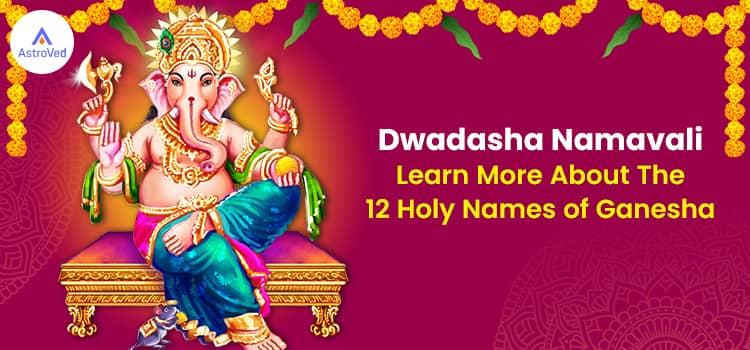Dwadasha Namavali: Learn More About The 12 Holy Names of Ganesha
Ganesha is also referred to as the God of beginnings and remover of obstacles. Ganesha is one of the most important Gods in Hinduism, who is shown with an elephant head. We pray to Him before starting any new task, whether it is an important task, a ceremony, or a new business. Before any pooja, Ganesha is worshipped first, and devotees also chant his twelve sacred names, also known as Dwadasha Namavali. These twelve names of Ganesha describe his power and nature. Reciting these twelve names during prayers or rituals makes you establish a connection with Ganesha. Let us learn more about these 12 significance-laden names and what they signify about Ganesha:
Meaning of Dwadasha Namavali
Dwadasha in Sanskrit means twelve, and Namavali means an array of names. These 12 names of Ganesha are auspicious and have been passed down through generations. Chanting these twelve names helps to invoke the blessings of Ganesha for success in work and to remove obstacles.
Meaning and Significance of the 12 Names
Sumukha
‘Sumukha’ translates into a beautiful face. "Su" means good or beautiful, and "mukha" means face. Ganesha's face glows with compassion, wisdom and divinity. This name reminds us that beauty is due to inner goodness and kindness. When we pray to Sumukha, we pray for a favorable start to our endeavors.
Ekadanta
‘Ekadanta’ means ‘having only one tusk’. "Eka" means one, and "danta" means tusk or tooth. As per legend, Ganesha broke off one of his tusks to use as a pen while writing the Mahabharata. This name symbolizes sacrifice for a greater cause and the importance of knowledge and learning. It teaches us that sometimes we must give up something valuable for the benefit of others.
Kapila
Kapila denotes a reddish-brown or tawny color and also refers to a great sage by the same name. This name means Ganesha's connection to ancient wisdom and philosophy. Sage Kapila was known for his profound spiritual knowledge. By invoking this name, devotees seek wisdom and spiritual understanding in their lives.
Gajakarnaka
This name describes Ganesha's large elephant ears. "Gaja" means elephant, and "karnaka" refers to ears. Ganesha's big ears symbolize the importance of listening carefully and being attentive to the needs of devotees. These ears also represent the ability to hear both the spoken and unspoken prayers of his followers. This name reminds us to be good listeners in our relationships with others.
Lambodar
Lambodar refers to Ganesha's prominent, round belly. "Lamba" means long or large, and "udar" means belly. Ganesha's large belly represents his ability to digest all experiences - both good and bad - with equanimity. It symbolizes contentment, prosperity, and the capacity to accommodate all of life's experiences. This name teaches us to accept life's ups and downs with grace.

Vikata
Vikata means fierce, formidable, or having an unusual form. While Ganesha is generally gentle and benevolent, he can be fierce when protecting his devotees from negative forces. This name represents his power to overcome difficulties and his strength in fighting against evil. It reminds us that sometimes we need inner strength and determination to face life's challenges.
Vighnaraja
Vighnaraja translates into the Lord of Obstacles. "Vighna" means obstacles, and "raja" means king or lord. This is perhaps Ganesha's most popular attribute. He is both the creator and destroyer of obstacles. He removes barriers from the path of righteousness while placing obstacles in the way of wrongdoing. This name emphasizes his role as the divine manager who ensures that things happen at the right time and in the right way.
Vinayaka
Vinayaka means leader, guide, or one who leads without a superior. This name establishes Ganesha as the supreme leader who guides devotees on the right path. He is approached first before beginning any worship or important task because he leads us toward success and away from failure. Vinayaka represents divine guidance and leadership.
Dhumraketu
"Dhumra" means smoke, and "ketu" refers to a banner or sign. This name refers to Ganesha's grayish color, like smoke, and also symbolizes his ability to clear away the "smoke" of confusion and ignorance. Just as smoke rises upward, this name represents the elevation of consciousness and spiritual growth.
Ganadhyaksha
"Gana" refers to groups or categories of beings, and "adhyaksha" means leader or supervisor. Ganesha is the leader of various groups of divine beings and spirits. This name represents his administrative abilities and his role in maintaining cosmic order. It also signifies leadership qualities and the ability to manage diverse groups harmoniously.
Bhalachandra
Bhalachandra refers to the crescent moon adorning Ganesha's forehead. "Bhala" means forehead, and "chandra" means moon. The crescent moon symbolizes the cyclical nature of time, growth, and renewal. It represents mental clarity, coolness of temperament, and the ability to remain calm under pressure. This name reminds us to maintain emotional balance and mental peace.
Gajanana
"Gaja" means elephant, and "anana" means face. This name directly refers to Ganesha's elephant head, which symbolizes wisdom, memory, and intelligence. Elephants are known for their excellent memory and gentle nature despite their great strength. This name represents the combination of power with gentleness and the importance of wisdom in all our actions.
Conclusion
The twelve names of Ganesha represent a complete spiritual practice in themselves. Each name offers a different lens through which to understand and connect with the divine qualities of this beloved deity. Whether you're seeking wisdom like Kapila, leadership like Vinayaka, or obstacle removal like Vighnaraja, these names provide a pathway to invoke Ganesha's blessings in all aspects of life.
By understanding and regularly chanting these sacred names, devotees can deepen their spiritual practice and invite the protective and benevolent presence of Ganesha into their daily lives. Remember, the power lies not just in the words themselves, but in the devotion, faith, and understanding with which they are chanted.






